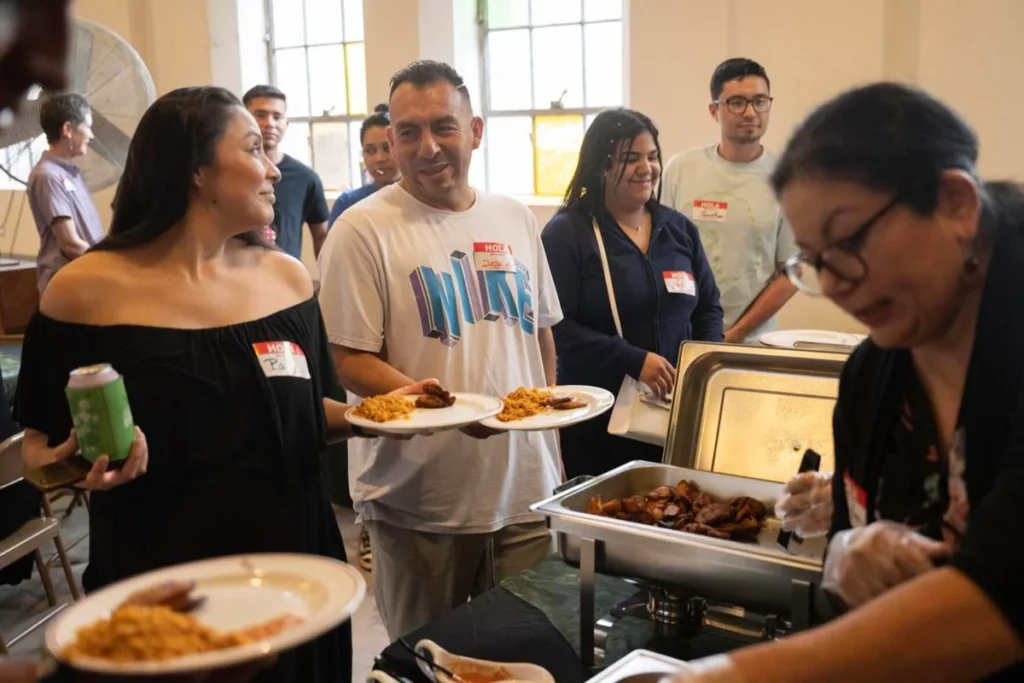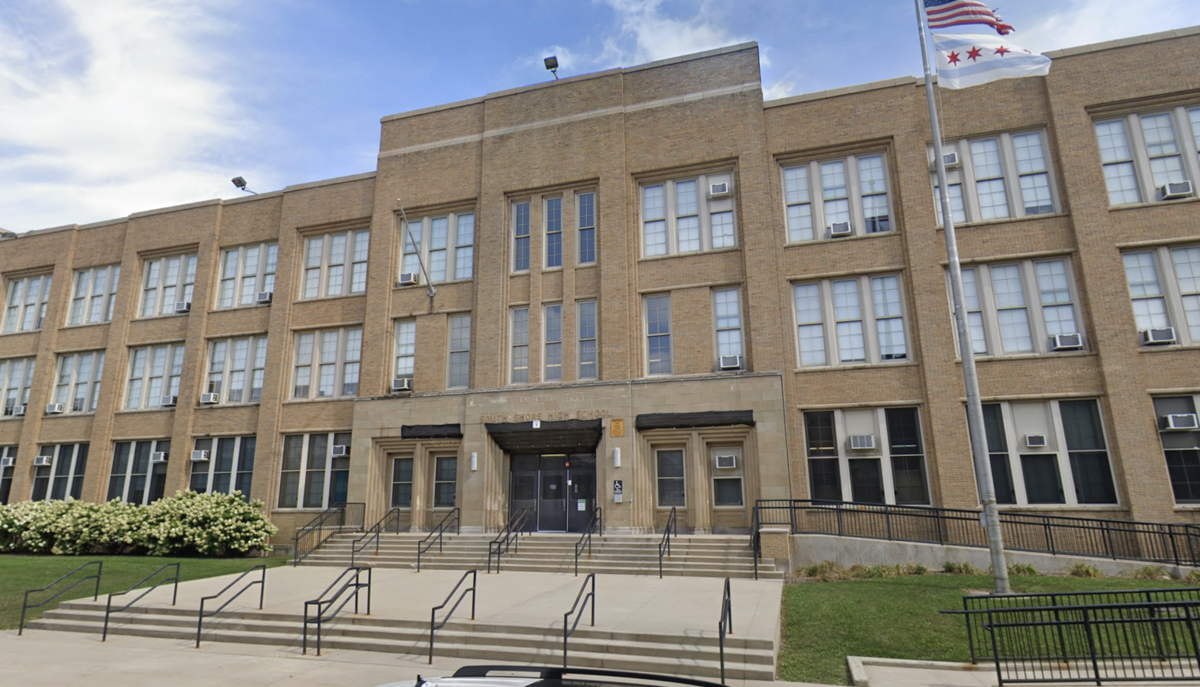As more and more migrants arrive from Latin America, the City, its residents and the migrants themselves are unsure of where they will be housed. Days before the end of her term, former Mayor Lori Lightfoot declared a humanitarian crisis. Mayor Brandon Johnson has begun addressing the issue on his first day.
The shuttered Wadsworth Elementary School in Woodlawn has been used as a migrant shelter since the beginning of February. As of April 25, the total number of migrants sheltered at Wadsworth was 496, with 428 of them being males and sixty-eight being females.
This solution was not without pushback from Alderwomen Jeanette Taylor (20th), Michelle Harris (8th), nor many of their constituents. Taylor said she was never informed by the Lightfoot administration that it would be setting up an encampment there. Taylor said she asked for a conversation back in October, shortly after buses full of migrants from Texas sent by Gov. Greg Abbott began arriving in Chicago, but she never received one.
“Time and time again I wanted us to have a conversation about where these camps were in the community and how we could help [the administration],” said Taylor. “It just seems like we picked places and we decided, or we didn’t get the decision, and the administration dropped the ball with telling folks where these camps would be.”
Harris made her opposition clear at the beginning of a City-organized community meeting held at South Shore International College Prep on May 4. Harris said she was on vacation a week before the meeting when she received a call from the City informing her of its intention to use the former South Shore High School in her ward as a respite center.
A respite center is akin to a pitstop where those seeking shelter can have a chair to sit on, a place to decompress, a hot shower and a meal. Often they wait until a bed in a shelter becomes available.
“We recognize this is a humanitarian crisis, but while this crisis may constitute an emergency for the City of Chicago, it does not constitute an emergency for the South Shore community or the residents of the 8th Ward,” said Harris.
The problem of providing shelter for migrants has been so great that according to the City, as of May 4, at least 200 had been sleeping in or occupying the entrances and vestibules of police stations around the city because they have nowhere else to go.
According to the Mayor’s Office, there are seven shelters and three respite centers across the city. As respite centers are intended to be temporary, the City will only be providing these basic amenities. However, the City has partnered with Chicago Public Schools (CPS) and City Colleges of Chicago to provide ESL classes, said Charles Mayfield, interim Chief Operations Officer of CPS.
Additionally, Mayfield said CPS will set up welcome centers for families and students where “they will be assessed and then placed at an appropriate school.”
The former South Shore High School will be used as a respite center. According to Kaila Lariviere of Chicago’s Office of Emergency Management and Communications (OEMC) a phased approach will utilize only the first floor of the school. With this approach, the respite center could fit anywhere from 250 to 500 migrants at a time.
Lariviere said the City has evaluated over 200 buildings across the city using various criteria. She said in order for a building to be approved for use as a shelter site it needs: to be large enough to accommodate the population, to have functional plumbing and showers, to have a functional kitchen with refrigerators and microwaves and to be handicap accessible.
Neither the Department of Family and Support Services (DFSS) nor the Mayor’s Office provided South Side Weekly with a list of locations and facilities that were considered as potential shelters.
The respite center in South Shore is expected to be more balanced on the gender spectrum because it is intended to provide refuge to families, not just predominantly male individuals, as the shelter in Woodlawn has seen.
There is not a determined amount of time for how long each individual’s stay is, as they will have to go through the immigration relief process and then receive work authorization, both of which can be bogged down in the bureaucratic process.
At a March 15 City Council meeting, the Council accepted an annual appropriation of $20 million from the Illinois Department of Human Services (IDHS) to be directed to the DFSS. DFSS is the department in charge of providing homeless services and, in this case, migrant services.
The majority of that fund, $16 million, supports shelter staffing and $2.4 million is intended for meals across 11 City-run shelters operating in 2023, including Wadsworth. The remaining $1.6 million are allocated to supporting costs of lodging new arrivals at other locations.
An amendment to that fund, Fund No. 925, emerged out of a City Council Committee on Budget and Government Operations meeting. Budget Director Susie Park proposed amending it by adding $51 million to it from a $1 billion 2021 budget surplus. It now awaits passage at the next City Council meeting on May 24.
Additionally, the City received $4.3 million in federal funding on May 5 to help alleviate the pressures of sheltering and staffing. The State of Illinois received the same amount of funding from the Federal Emergency Management Agency’s (FEMA) Emergency Food and Shelter Program.
The money is welcome, although a drop in the bucket when considering that Chicago asked for between $38.9 million and $66.7 million.
There are approximately forty DFSS-contracted staff supporting the shelter operations during the day and twenty-three overnight.
Many community members are taking issue with the fact that the City has not provided enough resources to its local residents, but is able to provide them to migrants, particularly when some of the neighborhoods that they have are placed in, such as Woodlawn and South Shore, have experienced disinvestment for decades.
When looking at the resources the City sets aside for Chicagoans, the 2023 Chicago Budget Ordinance allocates $10.6 million for all of the positions and salaries of DFSS and $37.3 million to Homeless Services across various departments including the Department of Public Health and the CTA.
Since the end of August 2022, Chicago has received 8,100 migrants with seventy-five to a hundred arriving daily. That number is expected to grow exponentially after the Covid-era policy Title 42 expired on May 11.
Crime and safety around the neighborhood was a major concern of many residents at the community meeting. Residents related multiple stories of having called the police to report crimes only to be told that there were more urgent matters. Sometimes they would wait up to an hour before an officer would arrive.
The former South Shore High School was being used as a police training academy that many residents welcomed. Training for police and firefighters is planned to continue at the recently opened academy on the West Side.
A lawsuit by Natasha Dunn, J. Darnell Jones and “South Shore neighbors” argues that the City is violating the terms of its lease agreement with Chicago Public Schools by using the site as a migrant shelter instead of a police academy, according to the Hyde Park Herald. A hearing is expected soon.
At the meeting, one resident raised the issue of migrants receiving background checks before entering neighborhoods. It was one of many concerns and statements that were rooted in anti-immigrant rhetoric, including a sign that read “Build the Wall 2024,” and references to individuals seeking asylum as “illegals”.
Those seeking asylum are fleeing from persecution and violence in their home countries and are seeking refuge in the United States through lawful means. After Title 42 expired, the country’s border policy reverted back to the long-standing Title 8, which grants individuals seeking asylum a lawful pathway into the country, in accordance with international law.

Nubia Willman, Director of the Office of New Americans, said, “When they come here, they also have to maintain certain behaviors because if they want to be able to apply for asylum, they cannot have a criminal record.”
According to U.S. Citizenship and Immigration Services, when an individual crosses the border they enter into what is called humanitarian parole, which “is granted to a foreign national (who is otherwise inadmissible) to temporarily enter the United States due to an emergency and urgent humanitarian reason or significant public benefit.”
In addition to increased CPD surveillance, the University of Chicago Police Department (UCPD) serves as a secondary law enforcement agency in an extended patrol area that includes Wadsworth School.
“As a neighbor in the Woodlawn community, the University is aware of the City’s decision to house asylum seekers at the Wadsworth School, as well as the ongoing dialogue between the City and community on this issue,” said a UCPD spokesperson.
As for the area around South Shore High School, 4th District Commander Keith Milmine said it is receiving additional help from the Cook County Sheriff’s Office, the Illinois Department of Corrections and Community Safety Teams. “[The] area is seeing more law enforcement resources than [anywhere] else in my district,” said Milmine.
Residents have taken issue with the fact that money is being directed to shelters when they have not seen similar levels of investment in their communities for decades. “We do not hear from City officials until election time,” said Rosey Enhoyne, who is a member of the 74th & Merrill block club.
However, Lisa Washington, the Supervising Planner for the Southeast Region of the Department of Planning and Development, said a total of $127 million dollars has been approved for different developments in the area over the next couple of years, including the Thrive Exchange and the Regal Mile Studio.
Ald. Maria Hadden of the 49th Ward on the North Side, who reopened a shuttered park fieldhouse to use a respite center, suggested using larger facilities like McCormick Place— which has 1,200 unused beds from Covid-era temporary housing— or vacant box stores, like the old Kmart in Gage Park.
IDHS canceled its plans to open the former Kmart after State Rep. Angelica Guerrero-Cuellar and Alderwoman Silvana Tabares expressed concern about the safety or readiness of the facility.
Mayor Brandon Johnson’s administration did not respond to the Weekly’s request for comment, but on May 15, upon being sworn in, he signed four executive orders—one of which calls for a deputy mayor for immigrant, migrant, and refugee rights.
The order “makes the new role responsible for the coordination and communication between all applicable City departments and officials related to the City’s efforts to support newly arrived and established immigrants, refugees, and migrants…and efforts to address immediate needs and long-standing policy and programmatic goals to ensure the efficacy of Chicago’s status as a welcoming and sanctuary city.”
In his inauguration speech that morning, Johnson gave a message of unity to a packed arena: “We get to tell a different story…We don’t want our story to be told that we were unable to house the unhoused or provide safe harbor for those who are seeking refuge here. Because there’s enough room for everyone in the City of Chicago, whether you are seeking asylum or you are looking for a fully funded neighborhood.”
If you believe there is a migrant site worth considering, you can fill out a DFSS online form.
Jacqueline Serrato contributed to this story.
Correction, June 1, 2023: The Weekly misattributed a quote to the Office of New Americans and has corrected it. We regret our mistake.
Ryland Pietras majored in Communications, Media & Theater at Northeastern Illinois University and hosts a weekly radio show. He previously wrote about the final mayoral forums.

